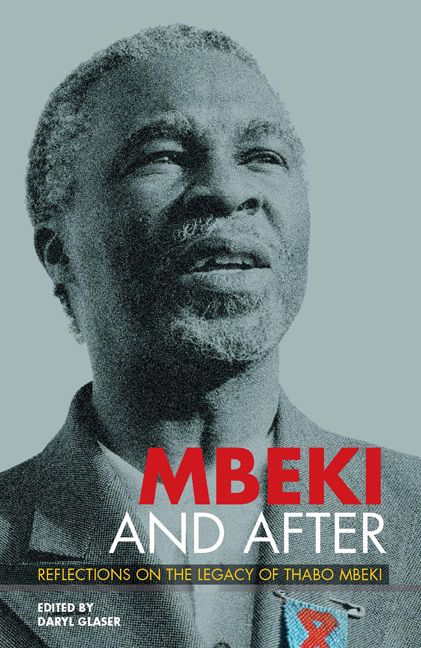Book contents
- Frontmatter
- Contents
- Acknowledgements
- Acronyms
- General Reflections
- The Mbeki Style Of Governance
- Mbeki And Society
- 5 Thabo mbeki and dissent
- 6 Civil society and uncivil government: The Treatment Action Campaign versus Thabo Mbeki, 1998-2008
- Mbeki And Race
- Mbeki Abroad
- Notes
- Contributors
- Bibliography
- Index
6 - Civil society and uncivil government: The Treatment Action Campaign versus Thabo Mbeki, 1998-2008
from Mbeki And Society
Published online by Cambridge University Press: 21 April 2018
- Frontmatter
- Contents
- Acknowledgements
- Acronyms
- General Reflections
- The Mbeki Style Of Governance
- Mbeki And Society
- 5 Thabo mbeki and dissent
- 6 Civil society and uncivil government: The Treatment Action Campaign versus Thabo Mbeki, 1998-2008
- Mbeki And Race
- Mbeki Abroad
- Notes
- Contributors
- Bibliography
- Index
Summary
INTRODUCTION
Civil society under Mbeki
This chapter examines the experience of one of South Africa's foremost pro-poor civil society movements, the Treatment Action Campaign (TAC), and uses it to reflect on the role that was played by social justice organisations during Mbeki's presidency (1999-2008). It juxtaposes the attitude of Mbeki's two governments to civil society organisations with the constitutional vision of active citizenship. It shows how, under Mbeki, organisations of civil society that were independent of the ANC were frequently denigrated by senior ANC leaders. When, on issues such as HIV/AIDS and poverty, they persisted with campaigns that ran contrary to the party line, concerted efforts were made to label and hence to delegitimise them. In the process, Mbeki sanctioned the erosion of key principles of constitutional governance and a contempt for principles of the rule of law.
Under apartheid the law was used to build the architecture of inequality and deprivation and to render the citizenry largely powerless over government policy and conduct. After 1994 law was put to a diametrically opposite purpose: apartheid law was replaced with a Constitution that seeks to foster social equality. Law now empowers, in no small part by providing people with a range of instruments they can use to exercise and advance their rights, as government goes about its daily business.
At the opening of the Constitutional Court building in 2004 Mbeki described the Constitution as ‘a vital compact at the core of our national life’. But, as TAC's story reveals, the practice of government during the Mbeki years was often contrary to the spirit of this compact.
Mbeki-sponsored AIDS denialism ought not to have been possible under the new legal order. Denialism is essentially a subjective state of mind. Maintaining it requires closing one's mind to reason, evidence and better judgement. However, in South Africa the president's embrace of AIDS denialism did not remain an individual matter. It came to infect the government and the ANC as a whole.
- Type
- Chapter
- Information
- Mbeki and AfterReflections On The Legacy Of Thabo Mbeki, pp. 128 - 160Publisher: Wits University PressPrint publication year: 2009



